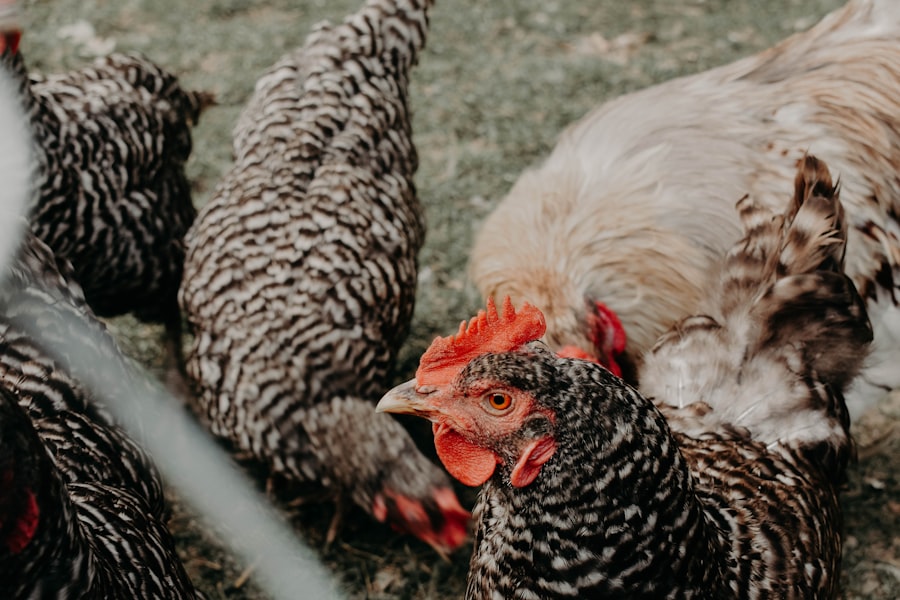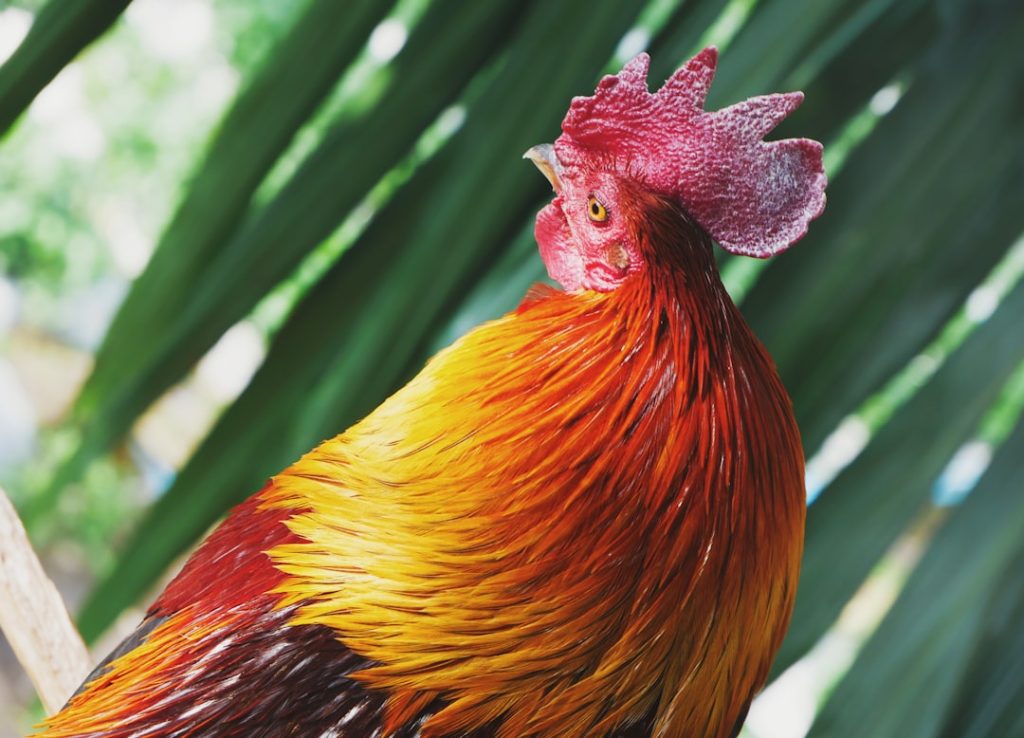When raising chickens, it’s essential to recognize that different breeds exhibit varying behavioral traits, including aggression levels. Aggressive behavior in chickens can manifest as pecking, chasing, or attacking other chickens and humans. This behavior can be challenging for chicken owners to manage and may impact flock dynamics and overall well-being.
Several factors contribute to aggressive behavior in chicken breeds. Genetics play a significant role, as some breeds have been selectively bred for traits like dominance and assertiveness. Environmental factors, such as overcrowding, lack of enrichment, and limited access to resources, can also increase aggression.
Additionally, social dynamics within the flock, including competition for food and mating opportunities, may exacerbate aggressive tendencies. Understanding the underlying causes of aggression in chicken breeds is crucial for effective management and prevention. By identifying these factors, chicken owners can implement appropriate strategies to minimize aggressive behavior and maintain a harmonious flock environment.
This may include providing adequate space, enrichment activities, and proper resource allocation to reduce competition and stress among the chickens.
Table of Contents
Key Takeaways
- Aggressive chicken breeds can pose a challenge for poultry owners
- Characteristics of aggressive chicken breeds include territorial behavior and dominance
- Breeds to watch out for include Rhode Island Reds and Old English Game
- Managing aggression in chicken breeds involves providing adequate space and enrichment
- Tips for handling aggressive chicken breeds include using protective gear and avoiding sudden movements
- Preventing aggression in chicken breeds requires early socialization and proper handling
- Responsible chicken ownership involves understanding and addressing aggression in chicken breeds
Characteristics of Aggressive Chicken Breeds
Behavioral Traits of Aggressive Chicken Breeds
In addition to their behavioral traits, aggressive chicken breeds may also have physical characteristics that contribute to their aggressive tendencies. For example, some aggressive breeds may have larger body size and more pronounced spurs, which they may use as weapons during aggressive encounters.
Physical Characteristics of Aggressive Chicken Breeds
These physical traits can make aggressive chicken breeds more formidable and potentially dangerous when exhibiting aggressive behavior.
Managing Aggressive Behavior in Chicken Flocks
It’s important for chicken owners to be aware of these characteristics when selecting and managing their flocks. By understanding the specific traits associated with aggressive chicken breeds, owners can take appropriate measures to manage and prevent aggressive behavior within their flocks.
Breeds to Watch Out For

While all chicken breeds have the potential for aggression, there are certain breeds that are known for their aggressive tendencies. Some of the most notorious aggressive chicken breeds include the Old English Game, Malay, Shamo, Asil, and Sumatra. These breeds have been selectively bred for traits such as fighting ability and dominance, which can contribute to their aggressive behavior.
Old English Game chickens, for example, are known for their territorial nature and strong fighting instincts. Similarly, Malay chickens are renowned for their aggressive behavior and high level of assertiveness within the flock. Shamo chickens, originating from Japan, are also known for their aggressive tendencies and strong territorial instincts.
It’s important for chicken owners to be cautious when selecting these breeds for their flocks, as they may require additional management and care to prevent aggressive behavior. Additionally, owners should be prepared to implement strategies for managing aggression in these breeds to ensure the safety and well-being of their flocks.
Managing Aggression in Chicken Breeds
Managing aggression in chicken breeds requires a proactive approach that addresses the underlying causes of aggressive behavior. One of the key strategies for managing aggression in chicken breeds is to provide a suitable environment that minimizes stress and competition within the flock. This can include providing ample space, access to resources such as food and water, and opportunities for enrichment and stimulation.
Additionally, managing aggression in chicken breeds involves careful selection and management of the flock dynamics. Introducing new chickens to the flock should be done gradually and with careful monitoring to prevent conflicts and aggression. Providing adequate supervision and intervention during social interactions within the flock can also help prevent aggressive behavior from escalating.
Furthermore, managing aggression in chicken breeds may involve separating aggressive individuals from the rest of the flock to prevent injuries and maintain peace within the flock. By implementing these management strategies, chicken owners can effectively address and minimize aggression within their flocks.
Tips for Handling Aggressive Chicken Breeds
Handling aggressive chicken breeds requires a cautious and informed approach to ensure the safety of both the chickens and their owners. When handling aggressive chicken breeds, it’s important to approach them calmly and confidently to avoid triggering aggressive behavior. Avoid making sudden movements or loud noises that may startle or provoke the chickens.
Additionally, using protective gear such as gloves and long sleeves can help minimize the risk of injury when handling aggressive chicken breeds. It’s also important to be mindful of the chickens’ body language and behavior cues, such as raised hackles or aggressive posturing, which may indicate an impending aggressive response. When handling aggressive chicken breeds, it’s crucial to establish clear boundaries and assert dominance without resorting to physical force or aggression.
Consistent and firm handling can help establish a hierarchy within the flock and minimize aggressive behavior over time.
Preventing Aggression in Chicken Breeds

Choosing the Right Breed
Selecting breeds with known docile traits and avoiding those with a history of aggression can go a long way in preventing aggression within the flock.
Creating a Suitable Environment
Providing ample space, access to resources, and opportunities for enrichment can help minimize stress and competition within the flock. This, in turn, can reduce the likelihood of aggressive behavior.
Effective Flock Management
Careful management of social dynamics within the flock is crucial for preventing aggression. This includes introducing new chickens gradually, monitoring their interactions, and providing adequate supervision during feeding and mating activities. By taking these proactive measures, owners can create a safe and harmonious environment for their flocks while minimizing the risk of aggressive behavior.
The Importance of Responsible Chicken Ownership
In conclusion, understanding and managing aggression in chicken breeds is crucial for responsible chicken ownership. By recognizing the characteristics of aggressive chicken breeds and implementing proactive strategies for managing and preventing aggression, owners can create a safe and harmonious environment for their flocks. Responsible chicken ownership also involves careful consideration when selecting breeds for a flock, prioritizing temperament and social behavior over other traits.
Additionally, responsible ownership entails providing a suitable environment that meets the physical and behavioral needs of the chickens while minimizing stress and competition within the flock. Ultimately, responsible chicken ownership requires ongoing attention to the well-being and behavior of the flock, as well as a commitment to proactive management and prevention of aggression. By prioritizing responsible ownership practices, chicken owners can ensure the safety and welfare of their flocks while fostering a positive relationship with their chickens.
If you’re interested in learning more about aggressive chicken breeds, you might also want to check out this article on keeping guinea fowl and whether they can live with chickens. Understanding the dynamics between different poultry species can help you create a harmonious environment for all your birds.
FAQs
What are some aggressive chicken breeds?
Some aggressive chicken breeds include the Malay, Shamo, Asil, and Ko Shamo. These breeds are known for their territorial and aggressive behavior.
What causes chickens to be aggressive?
Aggressive behavior in chickens can be caused by a variety of factors, including genetics, overcrowding, lack of space, and stress. Roosters may also become aggressive during mating season or when protecting their flock.
How can I handle aggressive chickens?
Handling aggressive chickens requires patience and caution. It’s important to establish yourself as the dominant figure in the flock and to use assertive body language. Avoid turning your back on aggressive chickens and use a stick or broom to keep them at a safe distance.
Can aggressive behavior be bred out of chickens?
While some aggressive behavior may be genetic, selective breeding can help to reduce aggression in chicken breeds over time. By choosing to breed from more docile individuals, it is possible to gradually reduce aggressive tendencies in a flock.
Are there ways to prevent aggression in chickens?
Preventing aggression in chickens involves providing adequate space, enrichment, and a balanced diet. Avoid overcrowding and ensure that the chickens have access to fresh water and a clean living environment. Additionally, handling chicks from a young age can help to socialize them and reduce aggressive behavior as they mature.
Meet Walter, the feathered-friend fanatic of Florida! Nestled in the sunshine state, Walter struts through life with his feathered companions, clucking his way to happiness. With a coop that’s fancier than a five-star hotel, he’s the Don Juan of the chicken world. When he’s not teaching his hens to do the cha-cha, you’ll find him in a heated debate with his prized rooster, Sir Clucks-a-Lot. Walter’s poultry passion is no yolk; he’s the sunny-side-up guy you never knew you needed in your flock of friends!







